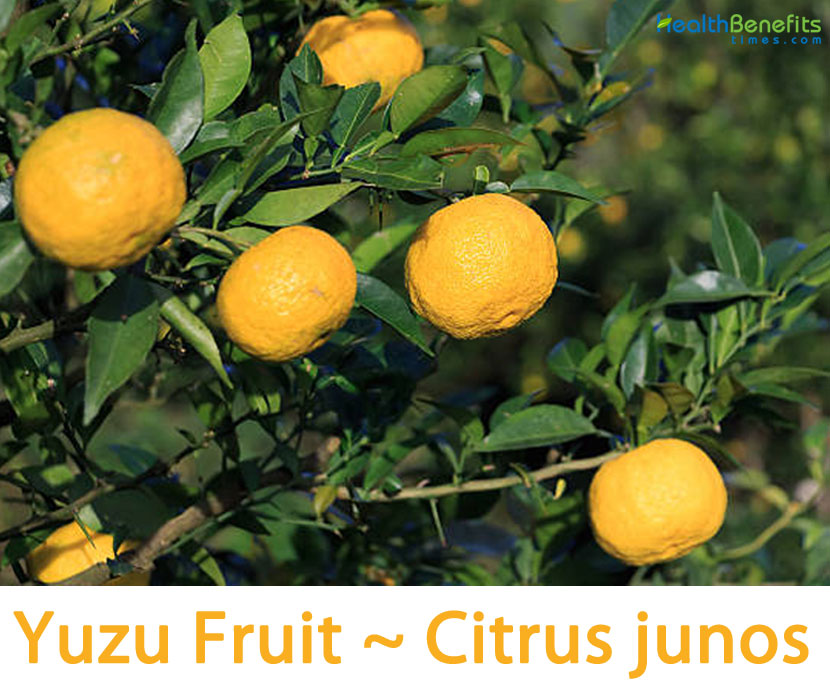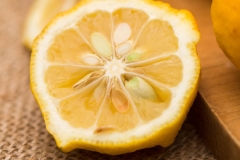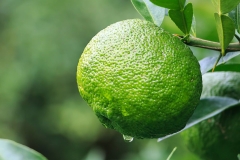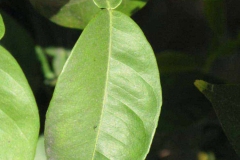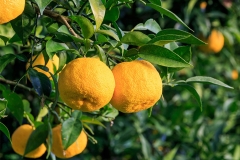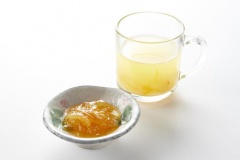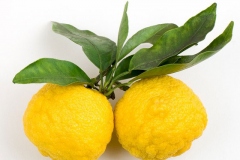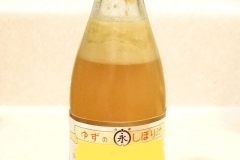Plant Description
Yuzu Fruit is a medium-sized evergreen shrub or small spiny tree that normally grows 2 – 7 meters tall. The plant commonly has many large thorns. The plant is grown in sunny areas in a rich, non-calcareous, light and well-drained soil. It will grow in semi shade, if needed. Leaves are lanceolate-acuminate, with rounded bases but with pointed, usually acuminate tips, slightly crenulate-margined toward the tips. Leaf blades are 5-7 cm long and 2.5 cm wide. Winged petioles are obovate, 18-30 mm long and 6-15 mm wide, with entire or very faintly crenulate margins. Normally leaves are notable for a large, leaf-like petiole, resembling those of the related kaffir lime and ichang papeda, and are heavily scented.
Yuzu Fruit Facts
| Yuzu Fruit Quick Facts | |
|---|---|
| Name: | Yuzu Fruit |
| Scientific Name: | Citrus junos |
| Origin | Central China, but very common in Japan, Korea, and other parts of the world |
| Colors | Either yellow or green depending on the degree of ripeness |
| Shapes | Small grapefruit like fruit about 5.5 cm - 7.5 cm (2.16 - 2.95 in) in diameter |
| Taste | Slightly spicy taste between grapefruit and mandarin |
| Health benefits | Helps reduce inflammation and chronic disease, Powerful anti-aging properties, Immunity Booster, Protects brain health, Acne prevention, Fights dangerous bacteria, Natural mood elevator, Blood circulation and cardiovascular health, Have an anti-cancer property, Glowing healthy skin, Great for weight loss, Prevents flu and cold, Cure vomiting and nausea, Promotes healthy blood flow, Muscle recovery, Reduces Blood Pressure, Improves Bone Health, Prevents the Risk of Anemia |
| Name | Yuzu Fruit |
|---|---|
| Scientific Name | Citrus junos |
| Native | Central China, but very common in Japan, Korea, and other parts of the world |
| Common Names | Japanese citron, yuzu |
| Name in Other Languages | Albanian: Yuzu Arabic: Sayatrus junus (سيتروس جونوس) Bengali: Lẏuju (ইয়ুজু) Bulgarian: Yuzu (Юзу) Catalan: Yuzu Cebuano: Yuzu Chinese: Xiāng chéng (香橙) Czech: Yuzu, citroník jutzu Danish: Yuzu Dutch: Yuzu English: Japanese citron, yuzu Estonian: Yuzu Finnish: Yuzu French: Oranger du Kan-Sou, Yuzu, citronnier du Japon German: Yuzu, Yuzu Mandarine Hebrew: יוזו Hindi: sitras junos (सिट्रस जुनॉस) Hungarian: Yuzu Indonesian: Yuzu Italian: Yuzù Japanese: Yuzu (ユズ) Korean: Yooja, yu ja na mu (유자나무) Latin: Yuzu Malay: Limau Yuzu Norwegian: Yuzu Persian: یوزو Polish: Yuzu Portuguese: Yuzu, limão-yuzu Punjabi: Yuzu (ਯੂਜ਼ੂ) Romanian: Yuzu Russian: Tsytrus yuzu (цитрус юзу), judzu (юдзу), yuzu (юзу), yunoye (юное) Spanish: Yuzú Swedish: Yuzu Vietnamese: Yuzu Waray: Yuzu |
| Plant Growth Habit | Medium-sized evergreen shrub or small spiny tree |
| Soil | Grown in sunny areas in a rich, non-calcareous, light and well-drained soil. It will grow in semi shade, if needed |
| Plant Size | 2 – 7 meters tall |
| Leaf | Leaves lanceolate-acuminate, with rounded bases but with pointed, usually acuminate tips, slightly crenulate-margined toward the tips, leaf blades 5-7 X 2.5 X 3.5 cm; winged petioles obovate, 18-30 X 6-15 mm, with entire or very faintly crenulate margins |
| Flower | Small, white, spring-like flowers are lightly scented |
| Fruit Shape & Size | Between 5.5 cm (2.16 in) and 7.5 cm (2.95 in) in diameter, but can be as large as a regular grapefruit (up to 10 cm (3.93 in) or larger) |
| Fruit Color | Either yellow or green depending on the degree of ripeness |
| Fruit Skin | Rough, uneven skin, similar to a grapefruit |
| Seed | Seeds are plump, about 12-14 mm long and 7-8 mm wide |
| Flavor/Aroma | Very strong and pungent |
| Taste | Slightly spicy taste between grapefruit and mandarin |
| Plant Parts Used | Fruits, seeds, rind |
| Propagation | By seeds and also through grafts |
| Health Benefits |
|
| Precautions |
|
Flowers and fruits
The plant has small; white, spring-like flowers that are lightly scented. Fertile flowers are followed by fruit that looks somewhat like a small grapefruit with an uneven skin. Fruits are initially green and can be either yellow or green depending on the degree of ripeness. Yuzu fruits, which are very aromatic, typically range between 5.5 cm – 7.5 cm (2.16 – 2.95 in) in diameter, but can be as large as a regular grapefruit up to 10 cm (3.93 in) or larger. It has a relatively thick yellow skin and is more aromatic and much sourer than other citrus fruits. Seeds are plump, about 12-14 mm long and 7-8 mm wide.
History
Although Citrus junos grows wild in Tibet and Korea, it is supposed to have originated in China and was brought to Japan for cultivation in the 10th century. Due to its popularity here, it is cultivated on a grand commercial scale particularly in Kochi Prefecture on the island of Shikoku, where large yuzu groves can be found.
Curiously, these other countries do not appear to produce yuzu essential oil in very large commercial quantities, and despite many attempts it has been unable to locate producers who are interested in exporting the oil. This is a pity, since it would be fascinating to compare the oils produced from the different origins.
Health benefits of Yuzu fruit
Curiously, this fruit may provide several benefits, including reducing inflammation and promoting heart health. Listed here are some of the emerging benefits and uses of yuzu.
1. Helps reduce inflammation and chronic disease
Research has concluded that chronic inflammation is the root of almost all disease, including some of the most threatening diseases like cancer, diabetes and coronary heart disease. Most people hate Yuzu’s lumpy skin, well those rugged edges have a compound called limonene. Research has found the high concentrate of limonene in Yuzu skin helps to reduce inflammation and prevent the formation of free radicals within the body.
2. Powerful anti-aging properties
Yuzu consists of good amount of vitamin C compared to normal lemon fruit. And it also has an important agent of anti-aging called flavonoids. Both these agents are essential for anti-aging because it helps to fight free radicals. Free radicals are an unavoidable thing that is naturally formed in our body. But it can also be dangerous. These free radicals are what made us have signs of aging such as wrinkles and fine lines. By consuming Yuzu, you can stay youthful for a long time!
3. Immunity Booster
Yuzu is packed full of antioxidants and Vitamin C, both of which are a force to be reckoned with when it comes to boosting your immunity. Vitamin C has the ability to reduce the duration and severity of illness, whilst the antioxidants help the neutralize free radicals and fight off unwanted infections.
4. Protects brain health
Research showed that Yuzu has the potential to maintain cognitive function and a healthy working brain. Researchers say it’s the buildup of beta amyloid proteins in the brain that are answerable for cognitive disorders like Alzheimer’s. Yuzu helps to fight the buildup of these bad proteins, and its antioxidant goodness protects against free radical damage to the brain.
5. Acne prevention
Acne is considered as a major problem for teens and young adult. It makes us insecure and we use a lot of things to cover it up. But by consuming yuzu, you can prevent it right away. Vitamin A in yuzu protects your skin from bacteria and bad elements that is the base of acne. Abundant vitamin c in yuzu fruit also decreases swelling that makes the appearance of your acne looks small. This citrus also have a substance called citric acid. Citric acid can help you exfoliate and remove dead skin cells. Yuzu has the benefits of a ton of skin-care products merged to one!
6. Fights dangerous bacteria
Research carried out by scientists in Kagoshima University concluded that Yuzu fruit has a great antibacterial property. It is proven to be effective against Eschericia Coli, Salmonella enteritidis and many more. These bacteria can cause bloody diarrhea, nausea and many more. It is confirmed that antibiotic doesn’t work against this and maybe actually worsen it. Yuzu can be a great alternative medicine.
7. Natural mood elevator
If you’re feeling aftermath of a relentlessly stressful day, the aroma of yuzu can help! It’s a well-known fact that citrus has the ability to boost mood and reduce stress. Research found that the Yuzu scent actually reduced levels of anger and anxiety in premenstrual women.
8. Blood circulation and cardiovascular health
Yuzu has a warming effect when consumed which is a result of increased circulation within the body. This in itself is great for you. Improved circulation allows you to detoxify and nourish your muscles and organs with life force energy, oxygen. Research have also shown that hesperidin and naringenin, two flavonoids found in yuzu have the ability to prevent blood clots, which is a big yes when it comes to maintaining good cardiovascular health.
9. Have an anti-cancer property
Cancer is a really lethal disease. The antioxidant and anti-inflammatory agent are great together. It is in the citrus’s flesh and aromatic substance. It actually makes a combo that can prevent all kinds of cancer. Yuzu consists of limonene and limonoid, both these substance are anti-inflammatory and antioxidant and is great for combating lethal cancer cells.
10. Glowing healthy skin
Vitamin C not only helps boost our immunity. It plays a vital role in the production of collagen in our body. Collagen is responsible for firm, healthy glowing skin and is something we all want a little more of in our lives. Vitamin A in yuzu helps to protect your skin against harmful bacteria that leads to those awfully timed and always unwanted blemishes and breakouts.
11. Great for weight loss
Yuzu is considered the best way for faster fat burning. According to recent studies, Yuzu can in fact activates and improve certain cells, resulting in faster fat burning. The acid in Yuzu acidified the body and it makes the body absorb calcium better. Calcium makes you burn fat faster and prevents further absorption of fat. The acid in Yuzu also makes you have a better digestive system so that you don’t load excess fat in your body.
12. Prevents flu and cold
Yuzu bath, or also known as yuzuyu is the way for some people to support for winter. Yuzuyu is a bath where the whole fruit is floated in steaming bath, prior to winter. Its antioxidant property is great for fighting flu and cold. Meanwhile, the tart aroma and essence revitalize and waken up our body, making our body more alert and ready for any sickness.
13. Cure vomiting and nausea
Yuzu can help you cure your seemingly untreatable nausea by offering its acidic contents. Its content is so acidic, it makes your body wake up and get over your nausea.
14. Promotes healthy blood flow
Blood is a vital part in our body. Which means that if our blood is healthy and flowing, our whole body will also be healthy. Vitamin C can help regulate a great blood flow. It increases the chance of the blood circulation from being attacked by free radicals. Also, it tones the blood vessel. These two functions are a match for healthy blood flow and healthy body.
15. Muscle recovery
Muscle builds up 30 to 40 percent of our body part. If one of them is hurt, it will really affect our day, and occasionally, it will take a long time to recover. Yuzu provide Malic Acid which can make your muscle recover better and faster. Malic Acid can also reduce the pain you are having from the hurt muscle. After you recover, malic acid can also make you have more energy.
16. Reduces Blood Pressure
Due to the high amount of potassium content found in yuzu fruit, it is very helps to reduce the blood pressure and keep our cardiovascular system healthy. Potassium present in yuzu acts as a vasodilator, which means it reduces the strain from the blood vessels and provide smooth passage to blood through the arteries that reduce the pressure from the cardiovascular system and prevent various types of issue related to blood pressure, such as hypertension.
17. Improves Bone Health
Due to the high amount of calcium, copper, phosphorus and magnesium found in yuzu, it is very beneficial for our bone health and protect our bone from disease, such as osteoporosis. All these above mineral are helping to improve the bone density in our body that helps to keep our bone strong even in our old age also. Beside this Vitamin C present in yuzu also helps to protect our bone from oxidative damage caused by free radicals.
18. Prevents the Risk of Anemia
Anemia is a disease of iron deficiency in our body and Yuzu is highly rich in iron content, so consuming yuzu on a regular basis can provide adequate iron in our body to prevent the anemia disease and symptom of anemia, such as fatigue, weakness, headache, dizziness, irregular heartbeat, etc.
Traditional uses and benefits of Yuzu
- Yuzu Fruit is used in a hot water bath with a view to prevent common colds, flu as well as heal chapped skin.
- Hot bath also encourages circulation throughout the body, thus ensuring better health.
- Consumption of this fruit facilitates cell activation as well as fat burning.
- Yuzu fruits are responsible for encouraging healthy circulation all over the body, thus alleviating muscle aches and relaxing the muscles of the body.
- In very early times, people used the yuzu seeds in the form of a natural medication for treating itchiness and skin irritations.
- Consumption of yuzu fruits is beneficial for people who want to overcome their drug addiction.
- Oil extracted from yuzu rind is said to have a stimulating effect and it helps to improve the circulatory as well as the digestive systems.
- Yuzu oil too is a potent antioxidant and is strongly anti-bacterial, making this oil very useful for treating common colds and flu.
- Yuzu essential oil is highly effectual for treating anxiety, stress, nervous tension and burn-outs, as its use helps in soothing as well as calming the tense nerves and normalizing emotions.
- Yuzu essential oil also elevates the depressed mind, helps to overcome frustration and regret.
- Oil is also effective in boosting one’s confidence levels.
- In olden days, people used the seeds of yuzu fruit in the form of a natural remedy for skin irritation as well as itchiness.
- Seeds are used to make natural cosmetics meant for toning up the skin.
- Consumption of yuzu fruits also helps the body to integrate vitamin C as well as encourage healthy circulation of blood throughout the body – something that helps to prevent various health conditions.
Culinary Uses
- Fruits have been used as a substitute of lemon and lime.
- They have a highly fragrant rind and flesh with an acid and tart flavor.
- The grated or slivered rind and juice are used for their distinctive, refreshing fragrance and flavor in Japanese-style dishes.
- The fruit juice is processed into distinctive, citrus-flavored vinegar.
- Fruit is also utilized as a source of citric acid.
- In East Asian cuisine, its juice, peel, and seeds serve as gourmet flavorings for vinegars, seasonings, sauces, and marmalades.
- In Japanese cuisine, it’s often added to pastes, powders, marmalades, jellies, sweets, and tea.
- It makes a great replacement for either of these fruits in dressings, condiments, desserts, baked goods, and drinks.
- The juice of this fruit is often used to produce wine and other liquor, and can be found as an ingredient in various cocktails.
- In Japan, the yuzu fruit juice as well as the rind is very popular among the folks and they extensively use both as flavoring agents.
- Juice and rind of yuzu are also used to make a beverage similar to lemonade, added to salad dressings and also included in ice creams.
Other Facts
- Essential oils extracted from the plant are used in perfumes, lotions, and soaps.
- This species is an important cold-resistant rootstock for other Citrus species.
- Yuzu oil is also commonly used in cosmetics, perfume, and aromatherapy.
- Apart from consuming the fruit raw as well as after cooking, people in Japan use the yuzu fruit for preparing an unusual hot bath.
References:
https://gd.eppo.int/taxon/CIDJU
http://www.theplantlist.org/tpl1.1/record/kew-2724157
http://tropical.theferns.info/viewtropical.php?id=Citrus+junos
https://en.wikipedia.org/wiki/Yuzu
https://davesgarden.com/guides/pf/go/90353/#b
https://www.cabi.org/isc/datasheet/13447
http://tn-grin.nat.tn/gringlobal/taxonomydetail.aspx?id=10725


